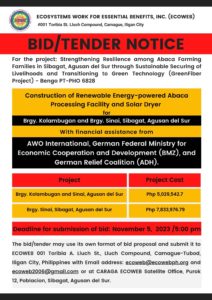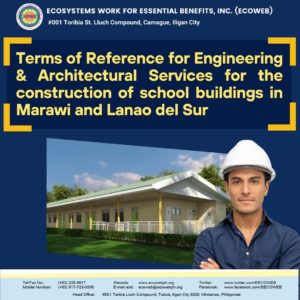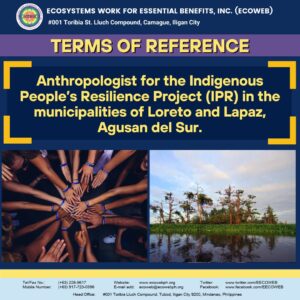
PROJECT BRIEF
ECOWEB is implementing a continuation of its project entitled Formation of Production Guilds and Social Enterprise for Economic Development of Indigenous communities in North-Western Mindanao.
The project particularly aims to achieve the following:
- Target group has been sustainably empowered in the autonomous management of their ancestral domains (AD).
- Smallholder households are practicing diversified, climate-smart agriculture.
- Self-managed social enterprises have been shown to contribute to the socio-economic empowerment of indigenous communities.
PROJECT SITE
The project covers three (3) ancestral domains (AD): Bayog, Zamboanga del Sur; Iligan City; and Dulangan in Manticao and Opol, Misamis Oriental.
PROJECT STAFFING
Vacant Position No. 1
Responsibilities
- Lead the project team in planning, implementation, problem solving, monitoring and reporting to ensure the accomplishment of project deliverables effectively and efficiently;
- Ensure that provisions of the contract between ECOWEB and the funding partner, the Bread for the World, are followed and considered in the implementation of project activities, allocation of funds, and submission of reports.
- Ensure that the strategies and activities outlined in the approved project documents are implemented properly and timely, well documented, and accurately reported.
- Manage team members, develop teamwork, supervise performance and mentor project staff as needed. Ensure quality outputs of project team members and check on quality of their submitted activity plan, community project proposals/requests and report documents.
- Communicate, report and provide updates to the Executive Director regularly and as the need arises on matters pertaining to project implementation.
- Coordinate with other project managers, program coordinators and other heads of units of ECOWEB.
- Negotiate contracts and agreements for the implementation of some components or activities of the project, and present proposed terms of the contracts and agreements to the Executive Director for appropriate action.
- Represent the project and the institution in dealing with government regulators and agencies, local governments, other stakeholders and partners, or with other entities as maybe delegated by higher authorities of the organization.
- Mobilization of local counterpart for the project operation.
- Develop a detailed plan and timelines for project implementation and prepare and submit required reports.
- Review and sign activity plans and reports of team members.
- Establish digital data base system for effective and timely monitoring of project outputs and outcomes. Integrate Talk to Loop in the system as a digital feedbacking mechanism.
- Facilitate the project team meetings, planning and assessment and perform other tasks to ensuring efficient, effective and accountable implementation of the project; and
- Perform highest level of accountability, comply code of conduct and organizational policies of ECOWEB and funding partner.
The major deliverables and tasks of the position would be:
1. Project Implementation Plan with detailed budgets and M&E plan using approved formats.
a. Semestral Project Implementation and M&E plans (digitized system)
b. Activity, budget and procurement plans
2. Reports using prescribed formats.
a. Semestral and annual reports following the format as stipulated in the Project contract with funding partner/donor.
b. Accomplishment reports (Activity, quarterly, semestral, Annual)
c. Fund utilization and reports using prescribed format.
d. Electronic and hard copy of periodic monitoring report utilizing approved template.
e. Staff performance and evaluation reports following approved templates
3. Draft service contracts of consultants and service providers for procurement.
4. Quality documents supporting community requests, including project proposals in support to the identified priorities of the partner communities
5. Report on mobilized local counterpart.
6. Communication and advocacy materials related to the target project outputs and outcomes.
7. Communication and information materials for the local partners including government agencies.
Reporting
The Project Manager will report directly to the Executive Director and provide regular progress reports to other units of the organization and other stakeholders.
Essential minimum qualifications and professional experience required
Education: Graduate and preferably with masteral units in any of the following degrees: Bachelor of Laws, Bachelor of Science in Community Development/Political Science/Social Work/Anthropology/Agriculture/Entrepreneurial Management, or related field
Minimum Experience Level:
-
- Significant experience (minimum five years) working in community-based sustainable development projects preferably implemented in IP communities;
-
- Minimum 3-year experience in actual project management;
-
- Experience in working with indigenous peoples’ organizations and communities, and familiar with the Indigenous Peoples Rights Act (IPRA)
-
- Understanding of key management and PME frameworks/tools;
-
- Experience working through partnerships, networking, advocacy and demonstrating leadership;
-
- Experience on preparing plans, reports and documenting activities practices.
Key Competencies
-
- Familiarity with the Indigenous Peoples Rights Act (IPRA), Mining law, and other land and forest related policies;
-
- Knowledge in conflict transformation and management;
-
- Strong skills in linkaging, partnership building and advocacy;
-
- Strong skills in drafting documents, advocacy paper, and reports of high quality and clarity using MS Word
-
- Strong time management skills, including the ability to work quickly and to meet deadlines;
-
- Team leader and ability to work as a team;
-
- Strong interpersonal skills, including across cultural contexts;
-
- Excellent skills in Microsoft Word and Excel.
Vacant Position No. 2:

Responsibilities:
- Lead in the implementation of activities related to land rights, strengthening of the capacity of the indigenous political structure and the ancestral domain development and management in general.
- Oversee and facilitate the formulation/updating of Ancestral Domain Sustainable Development and Protection Plan (ADSDPP) and lead in the preparation, designing, testing and actual conduct of training modules to capacitate IPS members and volunteers who will be involved in the formulation of ADSDPP.
- Facilitate the conduct of activities necessary to support the Indigenous Political Structures (IPS) in resolving land boundary/claims conflicts or any conflicts affecting the effective management of the ancestral domain.
- Provide support to IPS in the registration of CADT with the Registry of Deeds (RoD) and initiate activities to assist the IPS in processing the necessary issuance of Certificate of Non-Overlaps (CNO) by the Department of Environment and Natural Resources (DENR) and the Department of Agrarian Reform (DAR).
- Support and guide the IPS in engaging with agencies that have programs and projects within the AD including but not limited to the NCIP, DENR (CENRO, PENRO) and DAR, among others.
- Facilitate and provide necessary technical support for the lobby and advocacy for the integration of the ADSDPP in the local and regional development plans.
- Provide technical support to the IPS in the lobby for getting support from the LGUs, national government agencies, other NGOs and the private sector for support in the identified priority programs and projects by the indigenous communities as stipulated in the ADSDPP.
- Provide other necessary technical support for the strengthening of the capacity of the IPS and their effective engagement with their respective IPO and sectoral organizations within and outside the ancestral domain towards effective lobby for the protection of their land and IP rights.
- Mobilization of local counterpart to the cost of conduct of the project component.
- Develop a detailed plan with timelines for implementation of the project component activities.
- Participate in all team meetings, planning and assessment and perform other tasks to support the Project Manager in ensuring efficient, effective and accountable implementation of the project; and
- Perform highest level of accountability, comply code of conduct and organizational policies of ECOWEB and funding partner.
Deliverables:
- Two (2) Ancestral Domain Sustainable Development and Protection Plan (ADSDPP) formulated/updated following the process and standards under NCIP AO No. 02 series of 2018 mainstreaming gender, climate-resilience & conflictsensitivity.
- At least 30% of the land/resource-based conflicts resolved and final resolution demarcated on the ground. Parcellary survey initiated as needed with participation of youth members of the clan, approved by their IPS, reflected in the ADSDPP and ready for issuance of Certificate of Ancestral Domain Land Allocation (CADLA). Resolution by IPS of other forms of conflict with support provided as needed.
- Effective support for enhancing capacity of the IPS to resolve effectively existing and emerging conflicts in ancestral territories. *Effective here means that decisions are recognized and supported by the government and respected by the parties to the conflict.
- Areas within CADT with vested rights instruments issued by DENR and DAR are covered by Memorandum of Agreement between the IPS and, DENR and DAR.
- All required documents including survey results, resolutions and MoA’s are prepared and submitted to DENR and DAR for issuance of CNO and for registration with the LRA are submitted.
- Training modules and documentation of technical and empowerment support for the IPS.
- Project proposals submitted by IPS/IPO to agencies to generate support for the implementation of priority projects in the ADSDPP.
- IEC materials for distribution to the target communities.
- Communication materials and stories of output/outcome of activities conducted.
- Report on mobilized local counterpart.
- On time submission of activity plan and accomplishment/activity/financial report following the policy and guidelines of ECOWEB and funding partner.
The Land Rights and Empowerment Officer will report directly to the project manager and provide regular progress reports to the organization and other stakeholders.
Essential minimum qualifications and professional experience required
Education: Graduate in any of the following degrees: Bachelor of Laws, Bachelor of Science in Community Development/Political Science/Anthropology/Sociology, or related field.
Minimum Experience Level:
-
- Significant experience (minimum five years) working on indigenous peoples (IP) issues or land rights issues in either IP or non-IPs;
-
- Minimum experience of at least three years in advocacy and engaging the government
-
- Experience in the formulation of ADSDPP or similar area/spatial development planning;
-
- Experience in policy advocacy;
-
- Experience in land surveying and in dealing land and other resource-based conflicts;
-
- Experience in dealing with government agencies especially DENR, DAR and Register of Deeds;
-
- Experience working through partnerships, networking, advocacy and demonstrating leadership;
-
- Experience on preparing plans, reports and documenting activities practices.
Key Competencies
-
- Strong skills in drafting advocacy paper, program strategies and reports of high quality and clarity;
-
- Strong time management skills, including the ability to work quickly and to meet deadlines;
-
- Familiar with Indigenous Peoples Rights Act (IPRA) and related land laws in the Philippines;
-
- Strong interpersonal skills, including across cultural contexts;
-
- Excellent skills in Microsoft Word and Excel.
Vacant Position No. 3:

Responsibilities:
- Conduct baseline assessment of the agricultural practices in the communities.
- Develop a detailed plan and timelines for implementing sustainable agricultural practices in the community, to include promotion of abaca farming technologies and practices.
- Develop and institutionalize agriculture development training modules on climate-smart abaca and diversified farming.
- Provide training and technical assistance to the community members on good agricultural practices, including land preparation, crop selection, planting harvesting, and post-harvest handling.
- Establish model farms to serve as learning farms where climate-smart agriculture technologies can be learned by other farmers.
- Establish/improve community plant nursery for abaca planting materials and other crops for diversification.
- Ensure proper documentation of distribution of tools and all types of supports provided to the farmers production guilds/associations/cooperatives.
- Develop a marketing plan, in coordination with the Social Enterprise Development Officer, to help production guild members effectively sell their produce and generate income.
- Develop a monitoring and evaluation plan to track the project’s progress and impact.
- Establish and strengthen linkages between the communities and the government’s agricultural agencies and other stakeholders.
- Mobilization of local counterpart to the project.
- Provide regular progress reports to the organization and other stakeholders.
- Participate in all team meetings, planning and assessment and perform other tasks to support the Project Manager in ensuring efficient, effective and accountable implementation of the project; and
- Perform highest level of accountability, comply code of conduct and organizational policies of ECOWEB and funding partner.
Deliverables:
1. Baseline and periodic monitoring report of the agricultural practices in the target IP communities.
2. Farm development plans and monitoring report of development of farms of members of the Production Guild.
3. Quality training plan and modules and its consolidation and institutionalization.
4. Documentation and report of training, mentoring/coaching, technical support provided to the Production Guilds.
5. Documentation of community plant nursery established/improved/strengthened and planting materials produced and distributed.
6. Climate-smart agriculture technology application, learning, outcomes, and impact documentation.
7. At least 5 model learning farms (1-2 per AD) established and utilized as learning site by other farmers.
8. Marketing plan of farm produce by production guilds.
9. Proper documentation of activities and all distributed tools and support provided to the farmers production guilds.
10. Quality documentation of proposals/requests from community for support from the project or for facilitation for access from other agencies.
11. Report on the mobilized local counterpart for the project component.
12. On time submission of project component Implementation and M&E plan – annual, quarterly and monthly.
13. On time submission of accomplishment, activity, and financial report following policies and guidelines.
Reporting:
The Agriculturist/Farm Development Officer will report directly to the project manager and provide regular progress reports to the organization and other stakeholders.
Essential minimum qualifications and professional experience required
Education : Graduate in any of the following degrees: Agriculture, Agronomy, Agro-Forestry, or related field
Minimum Experience Level:
-
- Significant experience (minimum five years) working in sustainable agriculture development projects, preferably in Indigenous communities;
-
- Minimum 3-year experience in community development/organizing.
-
- Experience in dealing with Local Government units at barangay and municipal/city levels, and preferably with experience in dealing with regional agencies.
-
- Experience on preparing plans, reports and documenting activities practices.
Key Competencies
-
- Demonstrated knowledge of sustainable agriculture practices and techniques
-
- Strong interpersonal and communication skills, including the ability to work effectively with diverse groups
-
- Ability to work independently and as part of a team
-
- Proficiency in written and spoken English and the local language(s) spoken in the community.
-
- Strong skills in drafting documents and reports of high quality and clarity;
-
- Strong time management skills, including the ability to work quickly and to meet deadlines;
-
- Excellent skills in Microsoft Word and Excel.
To apply
Interested applicants should submit their letter of motivation and updated CV to [ecoweb@ecowebph.org or nanet.antequisa.ecoweb@gmail.com] indicating in the subject email: “Motivation to Apply for Staff position of the FPG-SEEDIC continuity project”.
The ECOWEB workforce consists of diverse capacities, cultures, beliefs, faiths and political persuasions. ECOWEB seeks to sustain and strengthen this diversity to ensure equal opportunities as well as inclusive working environment its entire workforce. Applications encouraged from all qualified candidates without distinction on the grounds of ethnicity, sex, sexual orientation and gender identity, age, religion, disability. Hiring decision will mainly be based on assessment of capacity and experience of the applicants in relation to the applied position.








